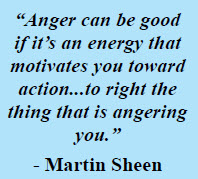 By: Lisa Philippart
By: Lisa Philippart
In my previous article, we discussed the mechanics of anger. This article will focus on the myth of anger as a negative emotion, and common ways anger leads to feeling good, not bad. We mistakenly classify anger as a negative emotion because people who are angry often do negative things. But if you think about it, it’s silly to define a thing by the quality of the thing that follows it. Here’s an example: anger isn’t a negative emotion just because after feeling criticized and angry, you lash out disrespectfully at a family member over Thanksgiving dinner. Your behavior of lashing out was in fact wrong and disrespectful. But the emotion that preceded it was a natural response to a perceived injustice your family member was supporting. Furthermore, because we as a society want to discourage aggressive behavior, we’ve labeled the emotion that often precedes it as negative…implying that the emotion itself is bad or wrong.
There’s a second reason we tend to think of anger as a negative emotion: because anger often precedes bad behavior, we assume the feeling and experience of anger is aversive or unpleasant. Most people will tell you that joy and excitement feel pleasant while sadness and guilt feel unpleasant. And most people will toss anger into the second category of unpleasant emotions. At least that’s what they’d tell you after the fact…turns out, in the moment, the experience of anger is actually far from unpleasant. In fact, it’s often pleasurable. Let’s look at some common ways anger leads to feeling good, not bad:
 Anger makes you feel in control. When you watch the news and feel terrified and helpless at the state of the world, getting angry at some person or group gives you the illusion of control, like you are really doing something and making a difference. In fact, the entire news industry is simply selling people their own anger and outrage.
Anger makes you feel in control. When you watch the news and feel terrified and helpless at the state of the world, getting angry at some person or group gives you the illusion of control, like you are really doing something and making a difference. In fact, the entire news industry is simply selling people their own anger and outrage.- Anger makes you feel like the sympathetic victim. Ruminating endlessly on how you’ve been wronged by other people creates a compelling story in your head that you are the victim…the person who has been unfairly slighted, and hopefully will have justice done to them eventually.
- Anger makes you feel morally superior. Every time you criticize someone or something, the unsaid implication is that you’re better. For example, “He’s such an idiot… (but I’m pretty smart). Her sense of fashion is atrocious… (but I’m incredibly discerning).”
 Anger distracts you from more painful emotions. One big reason so many people are so angry all the time is that getting themselves angry is the way they’ve learned to avoid or “take care of” other painful emotions. This is especially true of men in most cultures for whom anger is an “appropriate” emotion while fear, sadness, or guilt are not. Because anger is quite strong, ego-boosting, and comes on fast, it makes a great tool for temporarily avoiding another painful feeling. This process can become habitual (even addictive) such that for some people, generating anger is their default response to any painful feeling. This is actually such a common phenomenon that anger has been called the “great antidepressant.”
Anger distracts you from more painful emotions. One big reason so many people are so angry all the time is that getting themselves angry is the way they’ve learned to avoid or “take care of” other painful emotions. This is especially true of men in most cultures for whom anger is an “appropriate” emotion while fear, sadness, or guilt are not. Because anger is quite strong, ego-boosting, and comes on fast, it makes a great tool for temporarily avoiding another painful feeling. This process can become habitual (even addictive) such that for some people, generating anger is their default response to any painful feeling. This is actually such a common phenomenon that anger has been called the “great antidepressant.”
I’ll finish up my series on anger next time with the flavors of anger.
By: Lisa Philippart
Licensed Professional Counselor










 June 20, 2025
June 20, 2025



